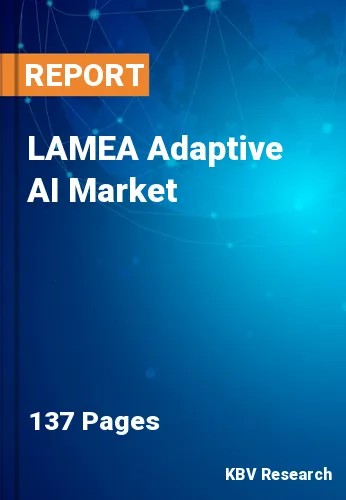The Latin America, Middle East and Africa Adaptive AI Market would witness market growth of 45.7% CAGR during the forecast period (2023-2030).
The exponential growth of data in the digital era catalyzes the development and adoption of adaptive AI. With vast datasets becoming more accessible, machine learning algorithms can leverage this information to refine their models and enhance their adaptability. The sheer volume of data enables these systems to learn and evolve in real time, improving decision-making processes and predictive capabilities. Breakthroughs in machine learning algorithms, particularly deep learning, have paved the way for these systems.
The availability of powerful computing resources, often facilitated by cloud computing services, has played a pivotal role in the rise of adaptive AI. Complex computations required for training and running sophisticated algorithms are now feasible at scale, enabling the deployment of these solutions across diverse industries. This democratization of computational power has lowered barriers to entry, fostering innovation and broadening the scope of these applications. The expansion of IoT devices and the growing interconnectivity of systems contribute to this landscape.
LAMEA countries are increasingly focusing on digital transformation initiatives across various sectors. Certain countries in the Middle East are investing in healthcare innovation, including applying these for diagnostics, personalized medicine, and data analytics to improve patient outcomes. Some cities in the Middle East are implementing smart city initiatives, where these technologies contribute to urban planning, traffic management, and public services. The aforementioned factors will drive the market growth in this region.
The Brazil market dominated the LAMEA Adaptive AI Market by Country in 2022 and would continue to be a dominant market till 2030; thereby, achieving a market value of $215.3 million by 2030. The Argentina market is showcasing a CAGR of 46.5% during (2023 - 2030). Additionally, The UAE market would register a CAGR of 45.4% during (2023 - 2030).
Based on Component, the market is segmented into Platform, and Services. Based on Application, the market is segmented into Offline Learning & Adaptation, Real-time, Context-aware Adaptation, Autonomous Decision-Making, and Others. Based on Technology, the market is segmented into Deep Learning, Computer Vision, Machine Learning, Natural Language Processing (NLP), and Others. Based on End-use, the market is segmented into BFSI, Healthcare & Life Sciences, Aerospace & Defense, IT & Telecommunications, Media & Entertainment, Retail & E-commerce, Manufacturing, and Others. Based on countries, the market is segmented into Brazil, Argentina, UAE, Saudi Arabia, South Africa, Nigeria, and Rest of LAMEA.
Free Valuable Insights: The Worldwide Adaptive AI Market is Projected to reach USD 11.9 Billion by 2030, at a CAGR of 42.3%
The market research report covers the analysis of key stake holders of the market. Key companies profiled in the report include RisingMax Inc., Suffescom Solutions Inc., Markovate Inc., Cisco Systems, Inc., LeewayHertz, Cygnus Softwares, Inc., Ness Group of Companies, Softura, Tech Mahindra Limited, and Apexon.
By Component
By Application
By Technology
By End-use
By Country
Our team of dedicated experts can provide you with attractive expansion opportunities for your business.

